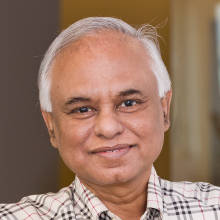[Photograph of Jimmy Wales founder of Wikipedia by Joi Ito under Creative Commons]
"If you are not embarrassed by the first version of your product, then you’ve launched too late." - Reid Hoffman, co-founder, LinkedIn
Business history is littered with examples that show us that the initial strategy with which an enterprise sets out to do business invariably fails.
Successful enterprises don’t call off their effort when their initial strategy proves ineffective. They give it a twist as many times as required, till they hit upon a successful strategy - either by chance, through superlative thinking, competitor’s mistake or through sheer luck. Once the successful strategy is discovered, the enterprise drops anchor.
Implied in embracing this strategy is an axiom: it would be unwise to put all resources - financial and non-financial - behind the initial strategies. Enterprises should hold back sufficient resources for subsequent strategic twists that they might have to undertake along the way till the successful one is identified.
An evangelical enterprise therefore identifies and places a bet on the best initial strategy and puts sufficient resources to make it a success. But it also holds back sufficient resources, in case the initial strategy does not work and the enterprise has to twist to arrive at another strategy.
Enterprises that ignore this twist strategy could make mistakes at great costs to themselves and their shareholders.
Are there examples of enterprises that have embraced the twist strategy to lay the foundation for business success?
Watch a video of this episode or continue reading
Episode 11 - New Rules of Business
Yes, Wikipedia is an example that leads the list. It 'twisted' its way to become the world's largest collaborative, free encyclopaedia. In March 2000, Jimmy Wales, the founder of Wikipedia, launched an online encyclopaedia and called it Nupedia. As was the norm then, he assembled an advisory board of experts to mentor this project. They, in turn, developed an intensive acceptance and editing process that included a seven-tier approval system to control the content of articles.
After 18 months, merely 20 articles were accepted despite an interest shown by over 2,000 contributors. The strategy of having experts control and drive the project was clearly not working. Wales needed to twist, and very quickly.
He found inspiration in the software industry where a collaborative approach was being followed. Work was released at the earliest possible opportunity and refined subsequently. This process was referred to as Beta testing.
A leading proponent of this strategy is Google. It releases its latest software version the moment it is 80 percent ready. And then based on user feedback, it keeps improving the software, live.
So Wales proposed releasing the earliest possible version of an article and letting several people work simultaneously to rapidly refine it. Since his advisory board did not agree with the new strategy, in January 2001, Wales decided to launch Wikipedia as a separate project. In just two weeks, more than 600 articles were produced. The new twist got traction and Wikipedia, as we know it, was born. Nupedia, which decided to remain rigid and not twist shut shop in 2003.
If you are still not convinced, then let me share with how YouTube twisted its way to become the world’s No. 1 platform for uploading and viewing videos. But that was not the initial strategy with which it was launched in 2005. To begin with, it was intended to be an online dating site called "Tune In, Hook Up".
On this site, people in search of a date would post videos and prospective dates would vote on them. This strategy did not find significant traction. And as it invariably happens, the serendipitous moment arrived unannounced for the founders.
One evening, one of the founders wished to watch the video of Janet Jackson’s wardrobe malfunction, but was unable to find it. The founders sniffed an opportunity for a "platform" business model where any video could be uploaded by anyone and could be viewed by anybody from any part of the globe.
Realizing the merit of this idea, the founders quickly twisted to embrace the new strategy. It found not just traction but attracted Google’s attention, and the latter purchased it for $1.65 billion in 2006 in an all stock deal. Today, the YouTube business is valued at $45.7 billion (as of February 26, 2014).
Once a company hits upon a successful strategy, it does look simple and obvious. Which is why armchair critics have made a profession of criticizing companies that keep twisting their strategy till they discover a successful one. "Why do they waste a company’s scarce resources by twisting so often only to discover such a simple and obvious strategy?" the critics ask.
A stinging retort to such critics was delivered by Christopher Columbus, the explorer who accidently discovered America on a voyage to discover India. Upon his return, a banquet was hosted in his honour. Many guests were not appreciative of Columbus’s effort, maintaining that anyone can set sail and accidently discover an island. Hearing this, Columbus got up and returned with an egg from the banquet table and asked his audience if anyone can make the egg stand on its head.
Several guests attempted but failed. Finally Columbus took the egg, gave it a firm tap against the table, cracking the shell. He then balanced the egg on its head and turned around to tell the audience: "Now anyone can make the egg stand on its head. It is no big deal after you have been shown how to do it."
Learn to make your enterprise twist compliant. It will weather many a storm and emerge stronger.
If you have any questions mail us at askrajesh@foundingfuel.com


